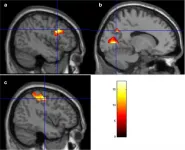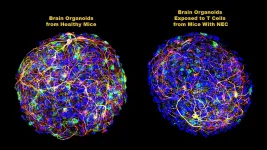(Press-News.org) A study led by University of Ottawa researchers provides empirical evidence that mindfulness has a significant impact on the brain of women suffering from neuropathic pain related to breast cancer treatment. The researchers showed that mindfulness-based stress reduction (MBSR) helps modulate neuropathic pain.
Their findings could make a difference in the lives of many women. In Canada, over a quarter of a million women are expected to be diagnosed with breast cancer - the most diagnosed cancer among women worldwide - in 2020. In addition to the psychological impacts of breast cancer, approximately 20 to 50 percent of survivors report experiencing chronic neuropathic pain following treatment.
We talked to senior author Dr. Andra Smith, Full Professor at the uOttawa School of Psychology, to learn more about the most recent findings published in the journal Mindfulness.
Why did you and your team decide to look at mindfulness to improve pain-related problems?
"Neuropathic pain is a very common side effect of chemotherapy and other breast cancer treatments. Pain killers do not always work and quality of life, cognitive abilities, and overall well-being can be reduced due to this pain. Due to these negative effects and the complexity of treatment for this type of pain following breast cancer treatment, it is important to provide adjunct treatment and management options.
We have heard a lot about mindfulness over the past few years, about how it helps people relax and feel better. If mindfulness, a non-pharmacological tool, can be used to help with neuropathic pain, women will feel better and might not experience such disruptive pain.
Pain is a subjective experience and mindfulness is often dismissed as a "buzz word." But our research provides objective, empirical evidence of a significant impact of mindfulness on the brain of these women."
How was the research conducted?
"We investigated the impact of an 8-week mindfulness-based stress reduction (MBSR) program on emotional reactivity among a sample of breast cancer survivors with chronic neuropathic pain. We used state-of-the-art brain imaging at The Ottawa Hospital, on their 3T MRI scanner and collected data on white matter health, brain activity during emotional pain related word processing and during resting state.
Women with neuropathic pain were imaged before and after an MBSR program, or treatment as usual. Pain, quality of life, and imaging were compared between the two groups and within the MBSR group pre- and post-MBSR."
What did you find?
"We observed major reductions in brain activity following mindfulness-based stress reduction in regions related to pain, emotional regulation, and cognitive processing. Both pain severity and pain interference, for the MBSR group, were significantly reduced after the 8-week training.
Our results show a significant improvement in brain health as well as in pain perception.
There are many anecdotal reports of how this or that made a person "feel better" but the really exciting results here are that we can see that there are actual changes in the brain and the way a person can alter their response to pain."
Why is it important?
"This research provides hope for a non-invasive method of easing the struggle of chronic neuropathic pain in women following breast cancer treatment.
Pain is something that people fear, and many people run into significant secondary problems because of their pain medication use, including drug misuse and mental health issues. Mindfulness has a neurophysiological effect that can alter one's perception of pain.
This research shows that there are adjunctive treatment options. If used properly, the information we have published can improve health outcomes for the people involved and could potentially also reduce health costs, as well as some of the related problems - particularly those related to mental health."
Who worked on this research?
"Dr. Patricia Poulin, at The Ottawa Hospital, was the clinical principal investigator with her research team of Heather Romanow, Yaad Shergill, Emily Tennant, and Eve-Ling Khoo. This included recruitment of the women and all clinical assessments.
My lab performed the scanning component of the study, including my imaging team of Dr. Taylor Hatchard, Ola Mioduszewski and Dr. Lydia Fang.
The data was collected over two years, from 2017 to 2019, funded by both Canadian Institutes of Health Research (CIHR) and Canadian Breast Cancer Foundation grants. We published three articles on our research in the last four months. The latest, "Reduced Emotional Reactivity in Breast Cancer Survivors with Chronic Neuropathic Pain Following Mindfulness-Based Stress Reduction (MBSR): an fMRI Pilot Investigation" was published in November 2020 in the journal Mindfulness."
Other papers related to this research:
Breast cancer survivors living with chronic neuropathic pain show improved brain health following mindfulness-based stress reduction: a preliminary diffusion tensor imaging study
Mindfulness-based stress reduction alters brain activity for breast cancer survivors with chronic neuropathic pain: preliminary evidence from resting-state fMRI
INFORMATION:
Physicians have long known that necrotizing enterocolitis (NEC), a potentially lethal inflammatory condition that destroys a premature infant's intestinal lining, is often connected to the development of severe brain injury in those infants who survive. However, the means by which the diseased intestine "communicates" its devastation to the newborn brain has remained largely unknown.
Now, working with mice, researchers at Johns Hopkins Medicine and the University of Lausanne in Switzerland have identified that missing link -- an immune system cell that they say travels from the gut to the ...
Indianapolis, Ind. - A team of researchers led by the Indiana Biosciences Research Institute Diabetes Center's Scientific Director Decio L. Eizirik, MD, PhD, has found that identifying new treatments for autoimmune diseases requires studying together the immune system AND target tissues. This study, "Gene expression signatures of target tissues in type 1 diabetes, lupus erythematosus, multiple sclerosis and rheumatoid arthritis," is featured in the Jan. 6, 2021, edition of Science Advances.
"We must move away from the present "immune-centric-only" view of autoimmune diseases," explains Eizirik. "Indeed, trying to understand these diseases focusing on the immune system only, ...
Researchers at Rush University Medical Center have found that opioid use might increase a person's risk of developing pancreatic cancer.
Published Jan. 6, the study, titled "Opioid Use as a Potential Risk Factor for Pancreatic Cancer in the United States," is the first in the country to show evidence that opioid use may be an unidentified risk factor contributing to the increasing incidence of pancreatic cancer.
In fact, opioid misuse and overdose have evolved into a public health crisis. Approximately 70,000 drug overdose deaths were reported in 2017, 68% of which involved an opioid.¹ The use of prescription opioids for the management of chronic pain ...
DURHAM, N.C. -- Before the pandemic, one-third of U.S. households with children were already "net worth poor," lacking enough financial resources to sustain their families for three months at a poverty level, finds new research from Duke University.
In 2019, 57 percent of Black families and 50 percent of Latino families with children were poor in terms of net worth. By comparison, the rate for white families was 24 percent.
"These 'net worth poor' households have no assets to withstand a sudden economic loss, like we have seen with COVID-19," said Christina Gibson-Davis, co-author of the study and professor of public policy and sociology at Duke University's Center for Child and Family Policy. "Their ...
Related to new research published in the January issue of Science Translational Medicine, Patrick McNutt, PhD, of the Wake Forest Institute for Regenerative Medicine, was part of the research team that demonstrated a new "Trojan horse" approach that produces strong antidotal efficacy in treating lethal botulism in mice, guinea pigs and rhesus macaque monkeys.
Furthermore, in a companion article, an independent team demonstrated that a related drug has robust efficacy in mice.
"This is one of those serendipitous moments in science where two groups, working independently, demonstrate similar results for a long-standing ...
Investing in biotech companies may not entail higher risk than investing in other sectors, according to a new report from Bentley University's Center for Integration of Science and Industry. A large scale study of biotechnology companies that completed Initial Public Offerings (IPOs) from 1997-2016 demonstrates that these companies produced more than $100 billion in shareholder value and almost $100 billion in new value creation despite a failure rate greater than 50%. The study compared the financial performance and economic value created by these biotech companies to non-biotechnology controls that had similarly timed IPOs.
The findings are published in PLOS ONE in the article "Comparing long-term value creation after biotech and non-biotech ...
Our reluctance to think, talk or communicate about death is even more pronounced when we deal with others' loss compared to our own, new research finds, but either way we tend to frame attitudes and emotions in a sad and negative way.
Teaching new more positive ways to address these difficult conversations is the focus of a new paper in PLOS ONE journal by palliative care specialists across Australia.
Led by Flinders University's Research Centre for Palliative Care, Death and Dying (RePaDD) and Palliative and Supportive Services, researchers from Flinders, CQUniversity Australia, NT Palliative Care Central Australia and University of Technology Sydney, surveyed 1,491 people about ...
Photosynthetic organisms tap light for fuel, but sometimes there's too much of a good thing.
New research from Washington University in St. Louis reveals the core structure of the light-harvesting antenna of cyanobacteria or blue-green algae -- including key features that both collect energy and block excess light absorption. The study, published Jan. 6 in Science Advances, yields insights relevant to future energy applications.
Scientists built a model of the large protein complex called phycobilisome that collects and transmits light energy. Phycobilisomes allow cyanobacteria to take advantage of different wavelengths of light than other photosynthetic ...
An analysis of 145 scholarly journals found that, among various factors that could contribute to gender bias and lesser representation of women in science, the peer review process itself is unlikely to be the primary cause of publishing inequalities. However, Flaminio Squazzoni and colleagues emphasize that the study does not account for many other factors that may affect women's representation in academia, including educational stereotypes and academic choices of priorities and specialties. Even as female representation has improved in fields such as the humanities, psychology, and the social sciences, a publication gap persists, with male authors continuing to publish more manuscripts in more prestigious journals. To better understand whether ...
Step into your new, microscopic time machine. Scientists at the University of Colorado Boulder have discovered that a type of single-celled organism living in modern-day oceans may have a lot in common with life forms that existed billions of years ago--and that fundamentally transformed the planet.
The new research, which will appear Jan. 6 in the journal Science Advances, is the latest to probe the lives of what may be nature's hardest working microbes: cyanobacteria.
These single-celled, photosynthetic organisms, also known as "blue-green algae," can be found in almost any large body of water today. But more than 2 billion years ago, they took on an extra important role in the history of life on ...





